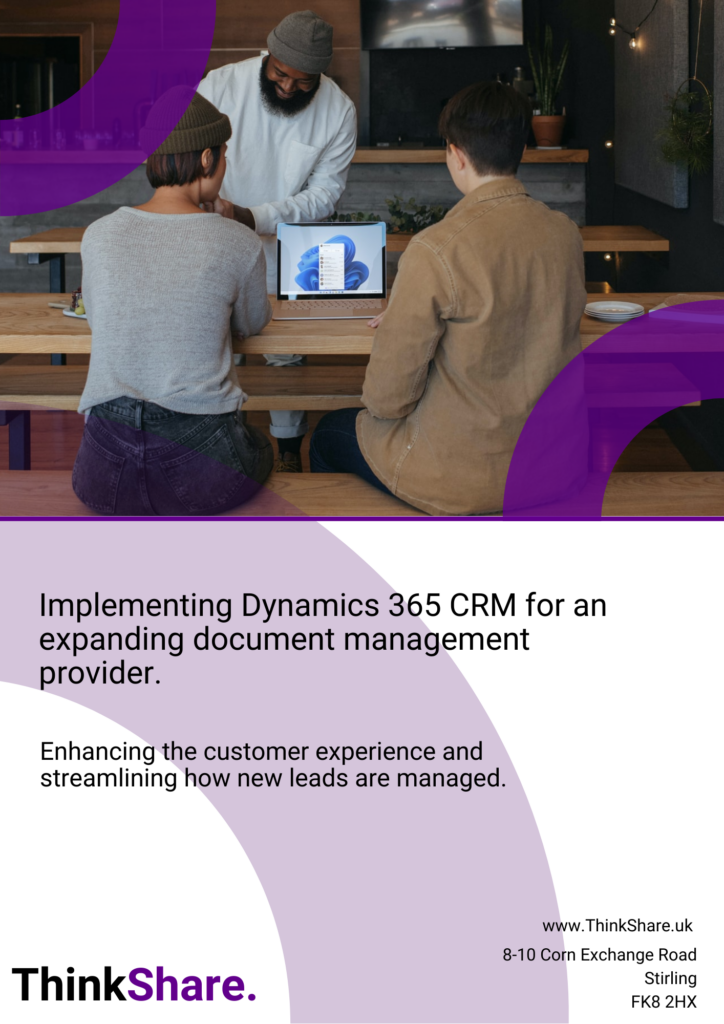Short on Time Summary
In order to gain approval for your Dynamics 365 project, you need to develop a detailed project plan that includes existing business challenges, a cost-benefit analysis, a project timeline and the estimated ROI. In this article, we explore the six key components of a persuasive business case.

Optimise your business with Dynamics 365
Are you losing productivity with inefficient operational processes? Do you need a CRM system to track customer behaviour and personalise interactions?
Without the right technology, you will miss out on opportunities which will lead to fewer sales, lost revenue and decreased customer loyalty.
Dynamics 365 is a cloud-based software that combines ERP and CRM functionality into a single platform. By unifying your technology and data sources, you can prevent communication breakdowns often caused by disparate systems. This not only engages your customers but also improves your employees’ productivity and morale when they can easily access the resources they need to do their job well.
Discover why you should invest in Dynamics 365 with an exploration of what each module can offer your business here.
In this article, we will explore how you can build a compelling and inspiring business case for Microsoft Dynamics 365.
A strong business case requires careful planning and research. It starts with the same six components:
- Identify the Challenge
- Provide a Solution
- Outline Benefits
- Outline Costs
- Provide Timeline
- Utilise Change Management
1. Identify the Challenge
Start by evaluating current business processes and identifying pain points and areas where your chosen solution could add value. Some examples are low customer engagement, complicated manual processes or inaccessible systems.
Ensure the project goals align with the long-term business strategy and organisational priorities. Where possible you should present your goals as quantifiable targets that can be measured to evaluate project success. This will help get key decision makers on board.
2. Provide a Solution
Dynamics 365 can solve a broad range of business challenges. An independent study by Nucleus revealed that for every $1 invested in Dynamics 365, organisations can expect an average return of $17 within the first 3 years of deployment. This is twice the industry average for CRM and ERP systems which typically deliver returns of $8.71 and $7.23, respectively.
Spend time researching the different features and integrations available. Dynamics 365 can be scaled up or down to meet your business needs, so you can seamlessly add modules in response to rapid growth or emerging challenges.
A strength of the platform is its familiar, user-friendly interface. Employees can quickly become comfortable with the new solution which speeds up onboarding and adoption.
Read our case study to learn how ThinkShare successfully implemented a Dynamics CRM solution to modernise a large company’s lead management process.
3. Outline Benefits
Create a convincing case for Dynamics 365 by highlighting exactly how it will benefit your business. Stakeholders want to see a clear and quantifiable ROI that justifies the investment.
Include predictions about increased sales and profit growth, in addition to cost savings from reduced human error, lower employee turnover and more. Cloud technology also reduces the IT support costs of maintaining on-premises systems.
It is important not to view quantitative figures in isolation. Qualitative benefits like better customer experiences and more accurate quotes and forecasts, can be just as valuable. For example, by improving customer satisfaction you will build a loyal customer base with a higher lifetime value.
4. Outline Costs
The cost of your project will vary depending on the desired timeframe, scope and size. The most notable cost is the price of Dynamics 365 including licensing options and cost per user. Microsoft offers flexible licensing to suit businesses of all sizes.
We recently published an article exploring the pricing options for nonprofit organisations. Read it here.
You will also need to factor in more subjective costs such as reduced productivity during implementation and internal resources required for user training.
When presenting your case, think about the long-term future of your organisation. Do not forget to estimate the costs and risks of not upgrading. How much money is your business losing by not having effective CRM and ERP systems in place? You can initiate change by quantifying the lost opportunities that come from maintaining outdated legacy systems.
Your Microsoft Partner can give further guidance on project costs. Arrange a call with one of our experts for more information.
5. Provide Timeline
Launching new software can be time-consuming and disruptive to day-to-day processes. Set realistic expectations with your stakeholders by including a project timeline with estimated timeframes for each stage.
We recommend you evaluate project outcomes and success over a 3 or 5-year period. This is when you will begin to see returns and will be able to calculate an accurate ROI figure.
6. Utilise Change Management
Ensure your business case is unbiased and research-focused by demonstrating awareness of the potential risks. You should anticipate concerns about expenses, training, implementation and user adoption, then proactively address them in your proposal. This will help executives make an informed decision and instil confidence in the project.
Make a plan to minimise the risks. Influential people acting as internal sponsors can create enthusiasm for Dynamics 365 and increase adoption. Or deliver intensive training to a small group who will become subject experts. These employees can then train others and answer questions about the new system for a smooth transition.
We hope this article helps you build a successful business case for the implementation of Dynamics 365.
If you are ready to move forward with a partner, we would be happy to help. We also offer an options appraisal if you are in the initial stages of selecting the right CRM or ERP solution for you. Contact our team to get started.
You can also keep up to date with our latest insights on LinkedIn and YouTube or subscribe to our monthly newsletter.


